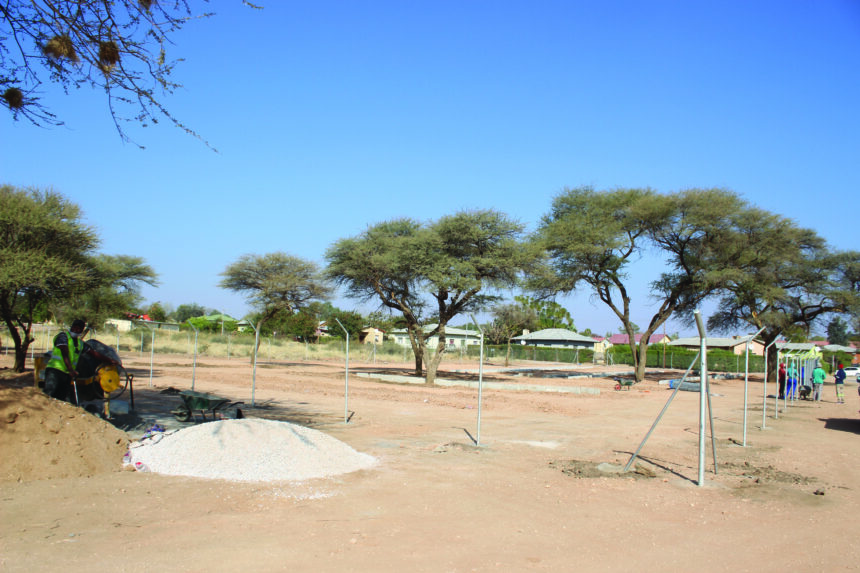Lahja Nashuuta
Namibian farmers’ unions, the Namibia Investment Promotion and Development Board (NIPBD) and other land reform stakeholders have rejected the Affirmative Repositioning (AR) Movement’s proposal for a stand-alone law on foreign land ownership in Namibia.
In 2019, AR submitted a petition to Parliament in the form of a draft bill for debate and discourse necessary for the decisive legislation to address land issues at the legislative level. The petition was then channelled to the Parliamentary Standing Committee on Natural Resources to gather input from key stakeholders involved in land matters, including offices, ministries,
agencies, organisations representing the
youth, women and marginalised communities as well as farmers’ unions and traditional authorities – the de facto custodians of customary land on behalf of the State.
The AR draft bill, ‘To Provide for the Regulation of Foreign Ownership of Land’, has four chapters, with Chapter 3 aimed at reaffirming and giving control and ownership of land to Namibians. AR condemned foreign land ownership, and called on the government to establish a regulatory framework – not necessarily the bill they submitted, but as long as the core principles remain intact.
They also want the leasing of land reduced from 99 years to 10 years. In the petition, the activists expressed concern that a huge amount of productive land remains in the hands of foreigners. AR leader Job Amupanda stated that white people own 27% of the land, black people own 16%, and the government owns only five million hectares, representing 14%. From the 12 380 privately-owned farms, 7 000 are owned by individuals, 2 800 by companies and 1 200 by the government.
A total of 150 farms are owned by trusts, and 71 by churches. In total, 250 farms, covering 1.2 million hectares, are owned by foreigners.
Legitimacy
The Legal Assistance Centre (LAC) has questioned the legitimacy of the bill, cautioning that it may contravene human rights as outlined in Chapter 3 of the Namibian Constitution.
A report by the parliamentary standing committee on natural resources states: “The LAC emphasised that the constitutionally-guaranteed right to property effectively means the right to buy and own property (whether jointly or alone); the right to use, access and enjoy the property; and the right to sell the property or dispose of it in any other way, including donations or in a will to your heirs.
The right to own property is also guaranteed by Article 17 of the Universal Declaration of the Rights and Duties of Man. Everyone has the right to own property alone as well as in association with others – and no one may be arbitrarily deprived of property. This right is guaranteed in many other international instruments to which Namibia is a signatory. Any limitation of this right in the domestic context must thus be weighed against international laws pertaining thereto”.
The LAC noted that it is unclear how the passing of the Regulation of Land Ownership by Foreign Nationals Bill and bringing additional powers would change the status quo.
Besides that, the LAC believes having another law on land ownership could be a duplication of laws and policies on land reform.
Instead, they advised on adding new categories or grounds of expropriation within existing legislation, rather than creating stand-alone legislation. The Namibia National Farmers Union (NNFU) indicated their support to resolve the land issue.
“It is a concern that at this stage, Namibian people are still struggling to have land. The NNFU is aware of the need to promote global competitiveness to allow the market to regulate itself. The reality remains that when the market fails to regulate itself, there is a need for the government to come in.
This is evident in the issue of land in Namibia. Thus, the NNFU supports any bill that aims to resolve the land issue,” stated the union. Similarly, the Namibia Agricultural Union (NAU) expressed support for the land reform programme initiated by the government, provided it is implemented in a fiscal and responsible manner.
The NAU said the proposed bill by AR is broad in its purpose and effect – and if it is promulgated in its current form, it would have an unconstitutional and severe impact on the fundamental rights of Namibian-owned companies and corporations to acquire and dispose of land in Namibia, as protected under Article 16 of the Namibian Constitution.
The union also cautioned that the arrangement of leases contemplated in the bill carries with it the real risk that mining companies might seek elsewhere for investment opportunities, resulting in a substantial loss of taxes, royalties and many thousands of employment opportunities in Namibia.
The NAU said the bill will preclude the acquisition of land by other countries to establish and maintain an efficient diplomatic presence in Namibia.
It will prejudicially affect the ownership of commercial agricultural land by all foreign nationals who had obtained the government’s concern as well as existing legislation and policies to acquire and own such land, and who, on account of such consent, had made substantial investments in such land to enhance the production and infrastructure thereof to create employment and contribute to the economy of the country.
Sharing similar sentiments, the NIPDB was not supportive of the bill in its current form, citing that it creates policy uncertainty for investors. Generally, the bill does not promote investments in Namibia. It renders the country uncompetitive, reduces the ease of doing business, and increases the cost of doing business. The board maintained that the 10-year lease proposed is too short and unattractive to investors, as 99 years is the international benchmark. The NAU likewise projects that financing will be difficult for investors to obtain, as 10 years is not commercially viable.
Meanwhile, the parliamentary standing committee on natural resources has recommended that the Ministry of Agriculture, Water and Land Reform engages with the petitioners (AR) before the Land Bill is tabled to harmonise and compromise on the proposals in the petition for inclusion in the draft Land Bill.
-lnashuuta@gmail.com



